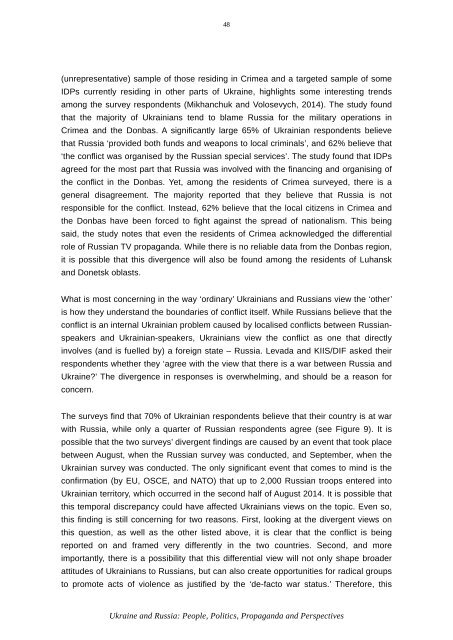Ukraine-and-Russia-E-IR
Ukraine-and-Russia-E-IR
Ukraine-and-Russia-E-IR
Create successful ePaper yourself
Turn your PDF publications into a flip-book with our unique Google optimized e-Paper software.
48<br />
(unrepresentative) sample of those residing in Crimea <strong>and</strong> a targeted sample of some<br />
IDPs currently residing in other parts of <strong>Ukraine</strong>, highlights some interesting trends<br />
among the survey respondents (Mikhanchuk <strong>and</strong> Volosevych, 2014). The study found<br />
that the majority of Ukrainians tend to blame <strong>Russia</strong> for the military operations in<br />
Crimea <strong>and</strong> the Donbas. A significantly large 65% of Ukrainian respondents believe<br />
that <strong>Russia</strong> ‘provided both funds <strong>and</strong> weapons to local criminals’, <strong>and</strong> 62% believe that<br />
‘the conflict was organised by the <strong>Russia</strong>n special services’. The study found that IDPs<br />
agreed for the most part that <strong>Russia</strong> was involved with the financing <strong>and</strong> organising of<br />
the conflict in the Donbas. Yet, among the residents of Crimea surveyed, there is a<br />
general disagreement. The majority reported that they believe that <strong>Russia</strong> is not<br />
responsible for the conflict. Instead, 62% believe that the local citizens in Crimea <strong>and</strong><br />
the Donbas have been forced to fight against the spread of nationalism. This being<br />
said, the study notes that even the residents of Crimea acknowledged the differential<br />
role of <strong>Russia</strong>n TV propag<strong>and</strong>a. While there is no reliable data from the Donbas region,<br />
it is possible that this divergence will also be found among the residents of Luhansk<br />
<strong>and</strong> Donetsk oblasts.<br />
What is most concerning in the way ‘ordinary’ Ukrainians <strong>and</strong> <strong>Russia</strong>ns view the ‘other’<br />
is how they underst<strong>and</strong> the boundaries of conflict itself. While <strong>Russia</strong>ns believe that the<br />
conflict is an internal Ukrainian problem caused by localised conflicts between <strong>Russia</strong>nspeakers<br />
<strong>and</strong> Ukrainian-speakers, Ukrainians view the conflict as one that directly<br />
involves (<strong>and</strong> is fuelled by) a foreign state – <strong>Russia</strong>. Levada <strong>and</strong> KIIS/DIF asked their<br />
respondents whether they ‘agree with the view that there is a war between <strong>Russia</strong> <strong>and</strong><br />
<strong>Ukraine</strong>?’ The divergence in responses is overwhelming, <strong>and</strong> should be a reason for<br />
concern.<br />
The surveys find that 70% of Ukrainian respondents believe that their country is at war<br />
with <strong>Russia</strong>, while only a quarter of <strong>Russia</strong>n respondents agree (see Figure 9). It is<br />
possible that the two surveys’ divergent findings are caused by an event that took place<br />
between August, when the <strong>Russia</strong>n survey was conducted, <strong>and</strong> September, when the<br />
Ukrainian survey was conducted. The only significant event that comes to mind is the<br />
confirmation (by EU, OSCE, <strong>and</strong> NATO) that up to 2,000 <strong>Russia</strong>n troops entered into<br />
Ukrainian territory, which occurred in the second half of August 2014. It is possible that<br />
this temporal discrepancy could have affected Ukrainians views on the topic. Even so,<br />
this finding is still concerning for two reasons. First, looking at the divergent views on<br />
this question, as well as the other listed above, it is clear that the conflict is being<br />
reported on <strong>and</strong> framed very differently in the two countries. Second, <strong>and</strong> more<br />
importantly, there is a possibility that this differential view will not only shape broader<br />
attitudes of Ukrainians to <strong>Russia</strong>ns, but can also create opportunities for radical groups<br />
to promote acts of violence as justified by the ‘de-facto war status.’ Therefore, this<br />
<strong>Ukraine</strong> <strong>and</strong> <strong>Russia</strong>: People, Politics, Propag<strong>and</strong>a <strong>and</strong> Perspectives


